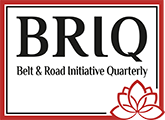EDITORIAL
On the verge of the Second World War, the Great Revolutionary Mustafa Kemal Atatürk used the following words to stress how the world would be shaped in the new age: “Look at the sun rising from the East. I see the rising of Eastern nations as I see the break of dawn today. Colonialism and imperialism will disappear from the face of the earth, and they will be replaced by an era of harmony and cooperation between nations, in which discrimination with respect to color, religion and ethnicity will not exist.”*
The beginning of the 20th century marks the beginning of the East’s rebellion and victories against imperialism. In the 21st century, developing countries from West Asia to Far Asia and from Latin America to Africa are rising to demand a just international order.
As the East develops and progresses, the West is increasingly shrinking and strained. With its position as an intercontinental bridge connecting Asia, Europe, and Africa via the Mediterranean, and thanks to its thousand-year old state tradition and its vast cultural heritage, Turkey will play a key role in the construction of this new order. Moreover, Turkey experiences a cycle in which the necessary conditions and opportunities have emerged for this potential to be actualized.
In the 21st Century Silk Road, the Belt & Road Initiative (BRI), Turkey comes together not only with China but also with the rest of Asia and with Africa and Latin America. Turkey is starting to take its honorable place among the emerging Asian nations and getting the opportunity to establish equal relationships with European countries and the United States of America (USA).
Standing out for its aspirations for common prosperity and shared development, the BRI is developing a new kind of cooperation model that has the potential to shape the world order beyond the economic benefits it provides to the participating countries.
BRIQ would like to invite academics, researchers, writers, artists, decision-makers and the business community from all across Asia, Africa, Latin America, and Europe to discuss this opportunity. BRIQ is a platform that is supposed to ensure that intellectual knowledge produced in Turkey will make a prominent contribution to the developing world’s effort to establish a just order. Indeed, BRIQ will be the voice and breath of Turkey as much as of other developing countries.
We are ambitious. Because we believe in Turkey and its people, and in the developing world’s history-making potential.
FİKRET AKFIRAT
Editor-in-Chief
